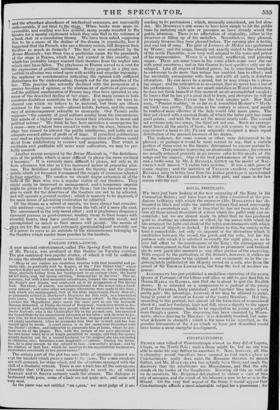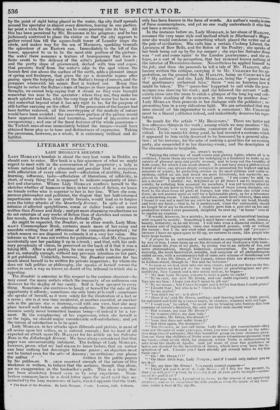CONSTANTINOPLE.
PEOPLE once talked of Constantinople almost as they did of Laputa, Utopia, or the North Pole ; such a thing might be, but no one was able to make his way thither to ascertain it. Now, however, all this is changing : recent travellers have assured us that such a place as Constantinople really does exist, the Russians threaten to march thither, and Mr. MACFARLANE has actually been there, and made the discovery that the inhabitants are Mussulmans, and that the city stands on the banks of the Bosphorus. Knowing all this as well as we do ourselves, Mr. BURFORD determined to obtain a view of this city of mosques, and the result of his labours is now to be seen in the Strand. On the very first aspect of the thing, it would appear that Constantinople affords a most admirable subject for a panorama; for by the point of sight being placed in the water, the city itself spreads around the spectator in almost every direction, leaving m one particu- lar point a vista for the rolling sea to come pouring into its hay. All this has been perceived by Mr. BURFORD in his progress; and he has judiciously contrived to place the visitor so that the city appears to gather round him till the square-built tower of Leander stops the circle, and makes way for the sea of Marmora, sparkling beneath the splendour of an Eastern sun. Immediately to the left of this tower, appeared to us to be the most able portion of the picture : the water there assumes a texture of transparency that does in- finite credit to the delicacy of the artist's judgment and touch ; and the pretty slope of greensward, decked with tree and copse, that presents itself from the water's edge to the spot where the houses first rise above the surface of the earth, adds a pleasant image of spring and freshness, that gives the eye a desirable repose after gazing upon the holyday suits of the Sultan's troop of rowers, and the
gewgaws wherewith his mimic fleet is tricked out. Being thus brought to notice the Sultan's train of barges in their passage from the Seraglio, we cannot help saying that it struck us they were brought somewhat too near to the spectator : where they are, they make too much splutter and fuss, while the very tinge of the water has been car- ried somewhat beyond what it has any right to be, for the purpose of still further carrying on the effect. If the procession of the barges had been further removed, all this overstepping of the modesty of nature would have been avoided ; the raree-show portion of the picture would have appeared incidental and becoming, instead of imperative and overpowering ; and one of the finest features of the whole panorama— the Turkish man-of-war immediately behind the barges—would have obtained fairer play as to tone and distinctness of expression. Taking the panorama, however, as a whole, it is extremely, brilliant and de- lightful.



















 Previous page
Previous page